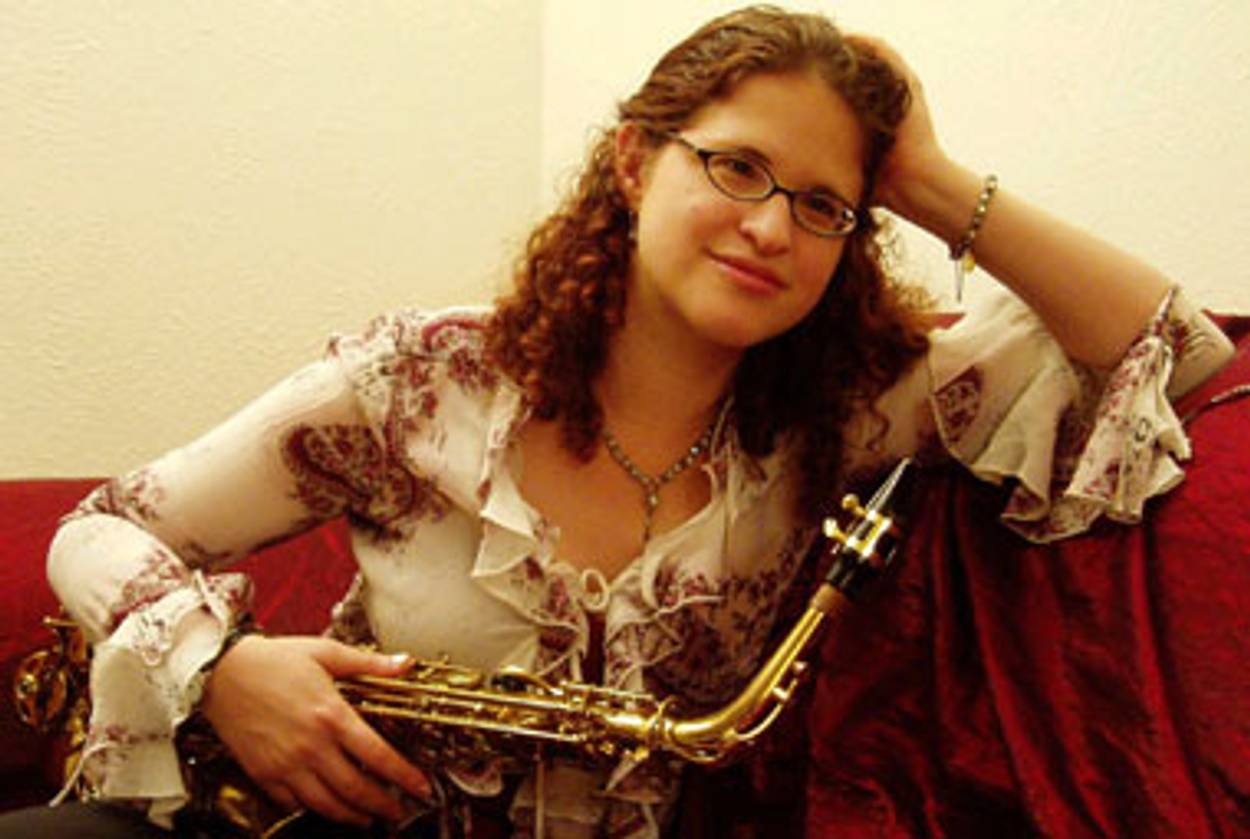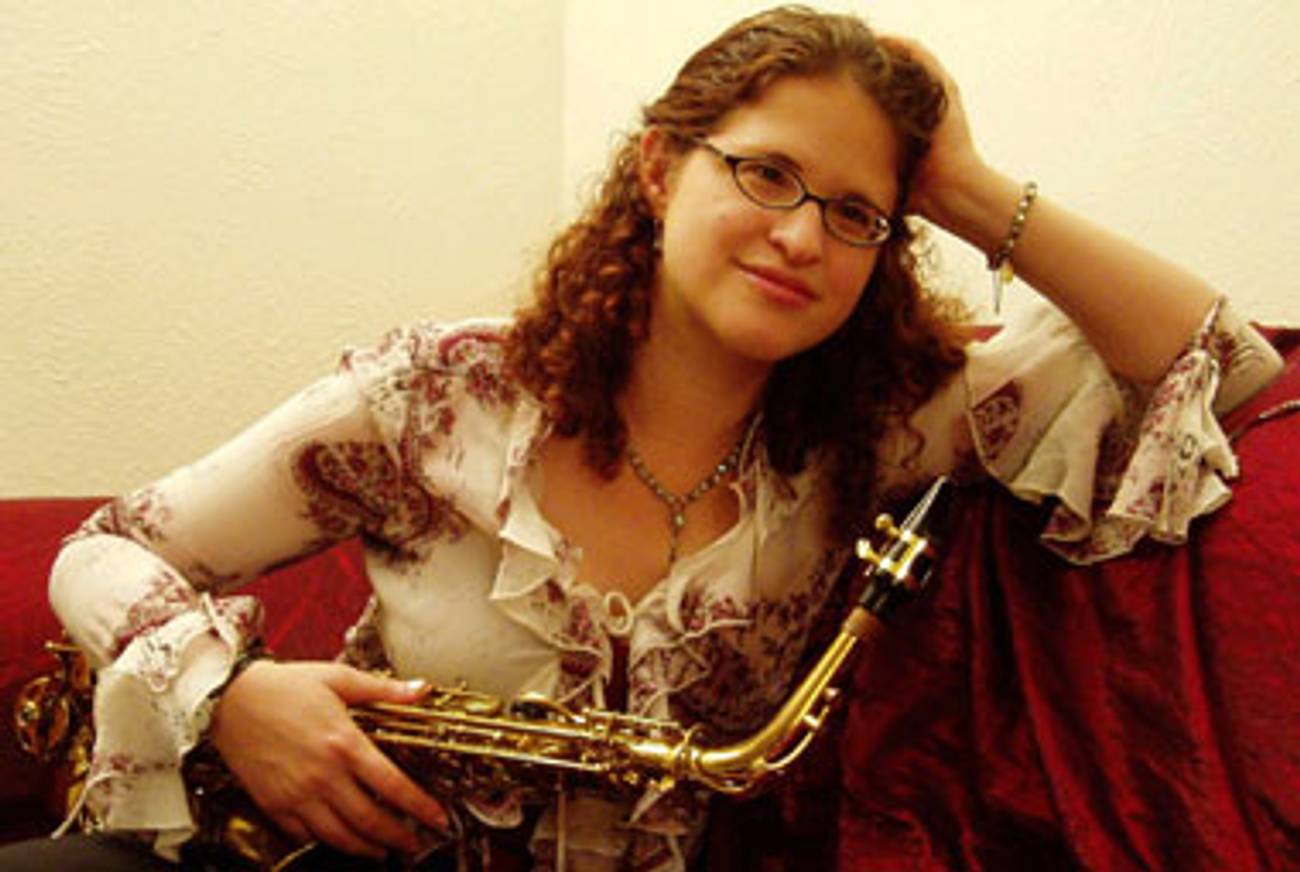Jazzed Up
New albums find inspiration in the Passover haggadah




I used to love Passover. Now that I have two small children, I tend to rush through the seders, hoping to tie things up before bedtime. But when I was a child myself, I savored those long nights: the special foods, the table packed with visiting cousins, and the songs, many of which we only sang once or twice a year.
I especially enjoyed the tunes with darkly appealing minor melodies, like “Ma Lecha Hayam,” or guttural Aramaic lyrics, like “Chad Gadya.” Of them all, “Ha Lachma Anya” (“This Is the Bread of Affliction”) was my favorite. So it might be nothing more than nostalgia that made me such a sucker for the jazzified version of the tune on saxophonist Idit Shner’s debut album, Tuesday’s Blues, flooding me with Passover memories at a time better suited to thoughts of the upcoming High Holidays. But I don’t think so.
Tuesday’s Blues is loaded with jazzed-up versions of Jewish and Israeli melodies, from “Lamidbar” to “Adon Haselichot.” But Shner, who played in the Israeli Air Force jazz band and earned a doctorate in saxophone and jazz studies at the University of North Texas (she’s now an assistant professor of jazz and classical saxophone at the University of Oregon), outdid herself with “Ha Lachma.”
For one thing, she recast it as a sprightly major melody, transforming the dirge-like original into something sunny and bright. She also installed a groovy descending bass line and punctuated the bridge with a couple of stop-time punches during which her backing trio drops out and she declaims the melody alone. It’s an old trick, and an effective one—the herky-jerky character of the bridge creates a sense of tension that is relieved by, and contrasts nicely with, the rest of the tune.
And then there’s the performance itself. Shner starts slow but by the end of her solo, she’s hammering away at the tune’s reinvented harmonies like a blacksmith beating hot iron, inventing little themes and throwing off showers of variations on them. Yet her rhythm section is so good—perfect, in fact—that you could tune her out entirely and still be left with one of the best trio performances in recent memory. Not that you’d want to, of course.
There’s yet more Passover material on tsuker-zis, the latest in a series of discs by trumpeter Frank London and singer Lorin Sklamberg that offer fresh interpretations of sacred Jewish music. Having already tackled nigunim and zemirot, the two long-time Klezmatics colleagues now turn their attention to Hasidic holiday songs, aided and abetted by electric guitarist Knox Chandler, Armenian-American oud player Ara Dinkjian, and North Indian percussionist Deep Singh.
Despite a few high-energy tracks—including a Chandler-driven version of an alphabetical acrostic Passover song (whose 25-word-long title lies beyond the scope of this document) that sounds pretty much the way a whirling dervish looks—the album as a whole exudes a mellow, meditative vibe: music to think about, or at least by. This might have something to do with Sklamberg’s light, reedy voice, with its intimations of emotional depth and fragility. Or it could be the result of the relaxed tempos and open, quasi-ambient textures favored on many of the tracks. But I suspect it is mostly the fault of Dinkjian, whose every pause and flourish threatens to take you out of this world and into another, far more interesting one.
The kind of musicianship displayed on both discs is wondrous to hear, and I have to admit that I tend not to expect it from singers, who, for all their talents, are often much less musically sophisticated than the instrumentalists who back them. That is most definitely not the case, however, with Ayelet Rose Gottlieb.
Whereas her previous recording, Mayim Rabim, was based exclusively on the Song of Songs, her latest, Upto Hear from Here, draws on a much more varied and uneven collection of texts. Some of Gottlieb’s self-penned lyrics, like the ones to “Life Is a Structure That Is (Accept It!)” and “Pomegranate Man,” the opening track whose fruity subject does provide a tenuous link to the upcoming holiday season, recall the bullshit that Mike Myers used to spew when doing his caricature of a chain-smoking beat poet. Then again, Gottlieb’s “Venezia,” a Middle Eastern-flavored composition dedicated to her grandmother and delivered in a mixture of English and Hebrew, with what sound like home audio recordings woven into the mix, is absolutely heartbreaking. Elsewhere, Gottlieb borrows some intriguing lines from the likes of Rumi, John Cage, and Agi Mishol.
In the end, however, the quality of the lyrics is almost irrelevant. Words play second fiddle to sound here, and sound is where Gottlieb shines. She’s a singer who thinks like an instrumentalist, and you can hear that in the very first bars of “Pomegranate Man,” when she sings wordlessly along with trumpeter Avishai Cohen and saxophonist Loren Stillman, blending in like just another horn player. Whether dipping into straight-ahead jazz, rummaging through her bag of gospel, soul, and Middle Eastern licks, or tossing off an avant-garde gesture, Gottlieb is always an integral part of the ensemble. That she’s able to stand shoulder-to-shoulder with her bandmates in so challenging an idiom—one marked by constantly shifting rhythms, ambiguous harmonies, and constant allusions to disparate genres—makes it even easier to forgive her lyrical lapses. I don’t know if Upto Here From Here contains quite as many delights as a pomegranate has seeds, but it has enough to make up for the lousy poetry.
Alexander Gelfand is a recovering ethnomusicologist, a sometime jazz pianist, and a former West African drummer. His work has appeared in the New York Times, the Chicago Tribune, the Forward, and elsewhere.